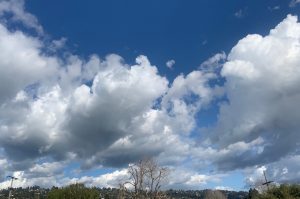
By Rev. Ryoko Osa
Right now, it’s “a crazy situation.” With the Covid-19 pandemic, life seems “out of control.”
Recently, my son and I went to a grocery store and we saw a long line winding through the parking lot. We gave up and went to another store, but couldn’t find any carts or hand baskets.
The store already was sold out of things normally available, like eggs. We waited in another long line at the register, when my cellphone received several alerts about a “shelter-in-place” order. A young man nearby said to no one in particular, “This is so crazy.” Yes, it was a crazy situation.
You might call life before the pandemic “ordinary.” This life now, you would call “crazy.”
As I drove home that day, I saw a beautiful blue sky with dark clouds floating above. On earth, I thought, we humans live fearing these crazy days. But the sky remained beautiful and calm as usual.
In Zen Buddhism, there’s a saying: “The ordinary mind—this is the Way” (Japanese: Heijo shin Kore dō).
We often find ourselves in situations we can’t control. We can’t control our journey through birth and death. If we think we have control and can just cruise through life, sooner or later, we’ll fall into a pit. Nobody wants to fall down and suffer.
Like the beautiful and calm sky on a crazy day, I’d like to have an “ordinary mind” in crazy times.
The religious philosopher Rev. Manshi Kiyozawa (1863-1903) said:
The source of power enabling me to be born and die in this world while living in my ordinary mind without panicking is Amida Nyorai, in which I entrust my life.
When I feel fear in my heart, I listen to what the Buddhas and teachers have said.
All of us have a limited lifespan, and, who among us can live even a hundred years? How much craziness will we see during that time? In one day, I saw and felt so much fear and anxiety about our future, and that was only at the grocery store. I now think of people who are falling ill, who have died, and who are losing jobs and businesses. These thoughts are driving me crazy.
But it is not only us. Imagine the countless number of people who lived before us, who suffered much more, experiencing war, famine, epidemics and natural disasters.
According to Buddhism, our minds are in turmoil because of our delusions. Our delusions are rooted in the Three Poisons—greed, anger and ignorance. I want to escape from my delusions, right my head and clear my mind. I need the nenbutsu, the words, “Namu Amida Butsu.” In Jodo Shinshu Buddhism, these words mean, “I take refuge in Amida Buddha.”
How long will my “crazy day” state of delusion last? Will it be a few weeks, a few months, or a few years? I know it will continue my whole life, coronavirus or no coronavirus. That’s why I must listen to the Buddha’s voice calling me: “Ryoko, wake up! It’s all delusion!”
I hear the Buddha calling me through other people around me. I feel the Buddha’s compassion in their honest words, sincere actions and warm smiles. Their simple acts sometimes make me want to cry. I think those acts are also through the Buddha’s compassion and I cannot express enough gratitude.
At the temple where I live and work, I feel it from the people I meet, the people who come to help, and even from people of the past, who supported this temple and handed it down to us. They all are expressions of the Buddha’s compassion.
The Buddha reminds me of the countless acts of compassion amid this “crazy day” confusion. As human beings living now, facing the pandemic and many hardships, this loving compassion comes also to us through nature, like the beautiful sky on a crazy day.
I also feel compassion from all those who have come before us, whose lives allow us to live today and to whom we still are connected.
Namu Amida Butsu tells us to listen to this inconceivable voice of compassion. This compassion may show us a different face than we hoped to see, but nevertheless reaches us right now, although it hides behind clouds on this “crazy day.” Our ancestors are proof, having lived in much harder times. Because of their lives, we now live, right here, right now.
This is not just “looking on the bright side.” I’m saying there’s a blue sky behind those dark clouds.
The Shoshinge, hymns written by Jodo Shinshu Buddhism founder Shinran Shonin, says:
The light of loving compassion grasps us always, it always shines on us and protects us. The darkness of ignorance already has broken through, yet the clouds of greed, anger, and hatred cover as always the blue sky of our ultimately real mind of faith. Although the sunshine is blocked by dark clouds, beneath the clouds there is brightness, it is bright, not dark.
Shinran’s teachings don’t say what we should or shouldn’t do, rather, they show me there’s light and life in the worst of times. Beneath the dark clouds, it is bright. Even so, the dark clouds of my ignorance cover the wisdom of the Buddha. And so amid these dark times, I find brightness in my heart, and gratefully share these thoughts with you.
-Rev. Osa is minister of Berkeley Higashi Honganji temple in California.

